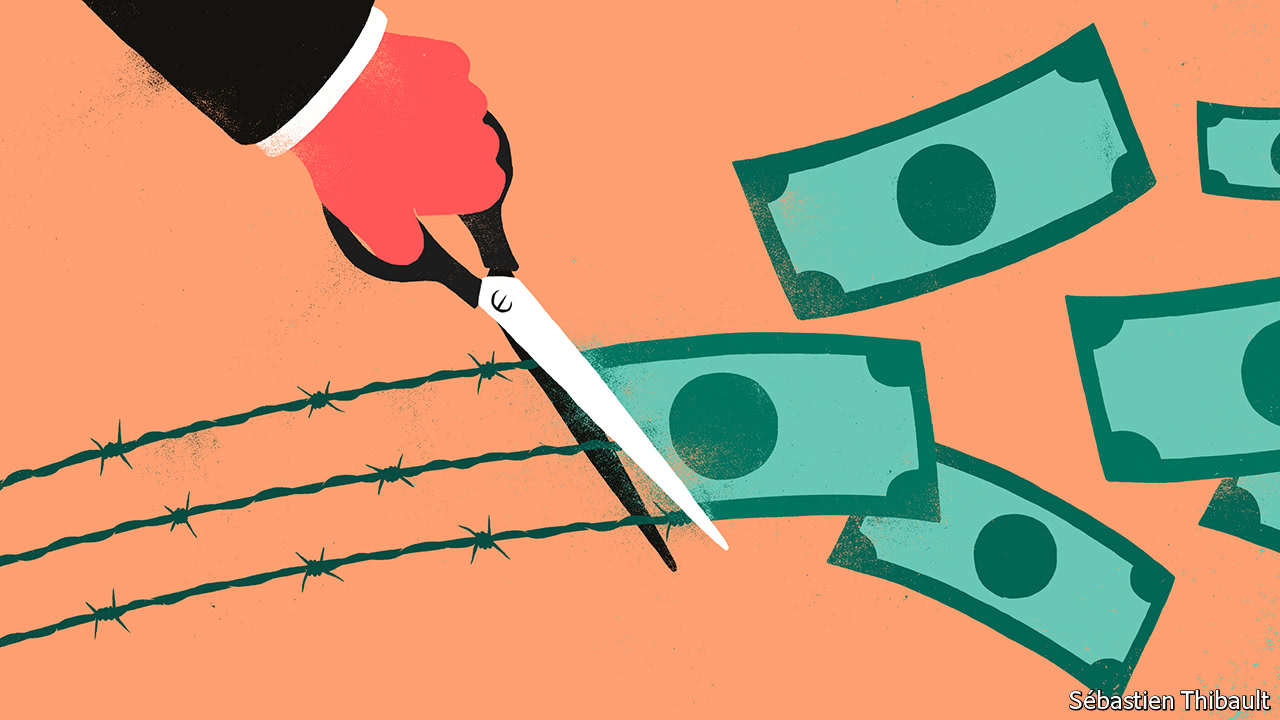If borders were open: A world of free movement would be $78 trillion richer https://t.co/CAGUFKOTFz via @TheEconomist
— Paramendra Bhagat (@paramendra) July 18, 2017
there are “trillion-dollar bills on the sidewalk”. One seemingly simple policy could make the world twice as rich as it is: open borders. ....... Workers become far more productive when they move from a poor country to a rich one. Suddenly, they can join a labour market with ample capital, efficient firms and a predictable legal system. ....... “Labour is the world’s most valuable commodity—yet thanks to strict immigration regulation, most of it goes to waste” ....... “Making Nigerians stay in Nigeria is as economically senseless as making farmers plant in Antarctica” ....... And the non-economic benefits are hardly trivial, either. A Nigerian in the United States cannot be enslaved by the Islamists of Boko Haram. ...... The potential gains from open borders dwarf those of, say, completely free trade, let alone foreign aid ......... “open borders” means that people are free to move to find work. It does not mean “no borders” or “the abolition of the nation-state”. ....... It is very hard to transfer Canadian institutions to Cambodia, but quite straightforward for a Cambodian family to fly to Canada. ....... The quickest way to eliminate absolute poverty would be to allow people to leave the places where it persists. ...... 630m people—about 13% of the world’s population—would migrate permanently if they could, and even more would move temporarily. Some 138m would settle in the United States, 42m in Britain and 29m in Saudi Arabia. ..... Leaving one’s homeland requires courage and resilience. Migrants must wave goodbye to familiar people, familiar customs and grandma’s cooking. Many people would rather not make that sacrifice, even for the prospect of large material rewards. ....... Wages are twice as high in Germany as in Greece, and under European Union rules Greeks are free to move to Germany, but only 150,000 have done so since the beginning of the economic crisis in 2010, out of a population of 11m. The weather is awful in Frankfurt, and hardly anyone speaks Greek. ......... Even very large disparities combined with open borders do not necessarily lead to a mass exodus. Since 1986 the citizens of Micronesia have been allowed to live and work without a visa in the United States, where income per person is roughly 20 times higher. Yet two-thirds remain in Micronesia. ....... Today there are 1.4bn people in rich countries and 6bn in not-so-rich ones. It is hardly far-fetched to imagine that, over a few decades, a billion or more of those people might emigrate if there were no legal obstacle to doing so. Clearly, this would transform rich countries in unpredictable ways. ....... Mass migration, they worry, would bring more crime and terrorism, lower wages for locals, an impossible strain on welfare states, horrific overcrowding and traumatic cultural disruption. ........ If lots of people migrated from war-torn Syria, gangster-plagued Guatemala or chaotic Congo, would they bring mayhem with them? ...... Granted, some immigrants commit crimes, or even headline-grabbing acts of terrorism. But in America the foreign-born are only a fifth as likely to be incarcerated as the native-born. ....... A study of migration flows among 145 countries between 1970 and 2000 by researchers at the University of Warwick found that migration was more likely to reduce terrorism than increase it, largely because migration fosters economic growth. ....... Immigrants are more likely than the native-born to bring new ideas and start their own businesses, many of which hire locals. Overall, migrants are less likely than the native-born to be a drain on public finances, unless local laws make it impossible for them to work, as is the case for asylum-seekers in Britain. ....... Foreign doctors and engineers ease skills shortages. Unskilled migrants care for babies or the elderly, thus freeing the native-born to do more lucrative work. ....... most Western cities could build much higher than they do, creating more space. ...... Would mass immigration change the culture and politics of rich countries? Undoubtedly. Look at the way America has changed, mostly for the better, as its population soared from 5m mainly white folks in 1800 to 320m many-hued ones today. ....... nearly all these risks could be mitigated, and many of the most common objections overcome, with a bit of creative thinking. ...... one solution would be not to let immigrants vote—for five years, ten years or even a lifetime. This may seem harsh, but it is far kinder than not letting them in. ....... why not charge them more for visas, or make them pay extra taxes, or restrict their access to welfare benefits? ...... it is better for the migrants than the status quo, in which they are excluded from rich-world labour markets unless they pay tens of thousands of dollars to people-smugglers—and even then they must work in the shadows and are subject to sudden deportation. Today, millions of migrants work in the Gulf, where they have no political rights at all. Despite this, they keep coming. No one is forcing them to. ...... If a world of free movement would be $78trn richer, should not liberals be prepared to make big political compromises to bring it about?There is a political solution: the creation of a world government. And there is a technical solution: a biometric ID for every person on earth.
